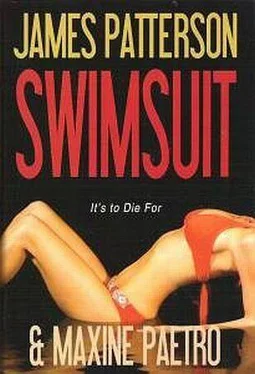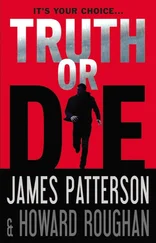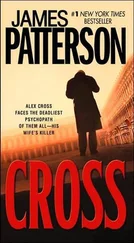Len inserted the flash drive, and his computer screen went from black to a shot of a dusky yellow room, candles burning, a bed centered on a wall. The camera zoomed in on a slender young woman lying belly-down on the bed. She had long, pale blond hair, wore a red bikini and black shoes with red soles. She was hog-tied with intricately knotted ropes. She seemed drugged or sleeping, but when the man entered the frame she began crying.
The man was naked except for a plastic mask and blue latex gloves.
I didn't want to see the video again. I walked to the glass wall that looked straight down the well of the atrium, from the forty-third floor to the tiny people who crossed the plaza on the ground floor below.
I heard the voices coming from the computer, heard Leonard gag. I turned to see him make a run for the door. When he returned a few minutes later, Leonard was as pale as a sheet of paper, and he was changed.
Leonard dropped back into the seat behind his desk, yanked out the flash drive, stared at it like it was the snake in the Garden of Eden.
“Take this back,” he said. “Let's agree that I never saw it. I don't want to be any kind of accessory after the fact or God knows what. Have you told the police? The FBI?”
“Henri said that if I did, he'd kill me, kill Amanda, too. I can't take that chance.”
“I understand now. You're sure that the girl in that video is Kim McDaniels?”
“Yeah. That's Kim.”
Len picked up the phone, canceled his twelve-thirty meeting, and cleared the rest of his afternoon. He ordered sandwiches from the kitchen, and we moved to the seating area at the far side of his office.
Len said, “Okay, start at the beginning. Don't leave out a bloody period or comma.”
So I did. I told Len about the last-minute Hawaiian boondoggle that had turned out to be a murder mystery times five. I told him about becoming friends with Barbara and Levon McDaniels and about being deceived by Henri's alter egos, Marco Benevenuto and Charlie Rollins.
Emotion jammed up my voice box when I talked about the dead bodies, and also when I told Len how Henri had forced me into my apartment at gunpoint, then showed me the pictures he'd taken of Amanda.
“How much does Henri want for his story? Did he give you a number?”
I told Len that Henri was talking about multimillions, and my editor didn't flinch. In the past half hour, he had gone from skeptic to inside bidder. From the light in his eyes, I thought he'd sized up the market for this book and saw his budget gap being overwhelmed by a mountain of cash.
“What's the next step?” he asked me.
“Henri said he'd be in touch. I'm certain he will be. That's all I know so far.”
Len called Eric Zohn, Raven-Wofford's chief legal counsel, and soon a tall, thin, nervous man in his forties joined our meeting.
Len and I briefed Eric on “the assassin's legacy,” and Zohn threw up objections.
Zohn cited the “Son of Sam” law that held that a killer can't profit from his crimes. He and Len discussed Jeffrey MacDonald, who had sued his ghostwriter, and then the O.J. book, since the Goldman family had claimed the book's earnings to satisfy their civil suit against the author.
Zohn said, “I worry that we'll be financially responsible to each and every one of the victims' families.”
I was the forgotten person in the room, as loopholes and angles were discussed, but I saw that Len was fighting for the book.
He said to Zohn, “Eric, I don't say this lightly. This is a guaranteed monster bestseller in the making. Everyone wants to know what's actually in the mind of a killer, and this killer will talk about crimes that are current and unsolved. What Ben's got isn't If I Did It. It's I Damn Well Did It.”
Zohn wanted more time to explore the ramifications, but Leonard used his executive prerogative.
“Ben, for now, you're Henri's anonymous ghostwriter. If anyone says they saw you in my office, say you came to pitch a new novel. That I turned it down.
“When Henri contacts you, tell him that we're fine-tuning an offer I think he'll like.”
“That's a yes?”
“That's a yes. You have a deal. This is the scariest book I've ever taken on, and I can't wait to publish it.”
The next evening, in L.A., the unreality was still settling in. Amanda was cooking a four-star dinner in her minuscule kitchen while I sat at her desk working the Internet. I had indelible pictures in my mind of the execution of Kim McDaniels, and that led me to multiple Web sites that discussed personality disorders. I quickly homed in on the description of serial killers.
A half-dozen experts agreed that serial killers almost always learn from their mistakes. They evolve. They compartmentalize and don't feel their victims' pain. They keep upping the danger and increasing the thrill.
I could see why Henri was so happy and self-satisfied. He was being paid for doing what he loved to do, and now a book about his passion would be a kind of victory lap.
I called out to Mandy, who came into the living room with a wooden spoon in her hand.
“The sauce is going to burn.”
“I want to read you something. This is from a psychiatrist, a former Viet Nam vet who's written extensively on serial killers. Here. Listen, please.
“ 'All of us have some of the killer in us, but when you get to the proverbial edge of the abyss, you have to be able to take a step back. These guys who kill and kill again have jumped right into the abyss and have lived in it for years.' ”
Mandy said, “But Ben, what's it going to be like to work with this? creature?”
“If I could walk away from it, Mandy, I'd run. I'd run.”
Mandy kissed the top of my head and went back to her sauce. A moment later, the phone rang. I heard Mandy say, “Hang on. I'll get him.”
She held out the phone to me with a look on her face that I can describe only as one of pure horror.
“It's for you.”
I took the phone, said, “Hello.”
“So how did our big meeting in New York go?” Henri asked me. “Do we have a book deal?”
My heart almost jumped out of my chest. I did my best to keep calm as I told him, “It's in the works. A lot of people have to be consulted for the kind of money you're asking.”
Henri said, “I'm sorry to hear that.”
I had a green light from Zagami, and I could have told Henri that, but I was looking at the twilight coming through the windows, wondering where Henri was, how he'd known that Amanda and I were here.
“We're going to do the book, Ben,” Henri was saying. “If Zagami isn't interested, we'll have to take it somewhere else. But either way, remember your choices. Do or die.”
“Henri, I didn't make myself clear. We have a deal. The contract is in the works. Paperwork. Lawyers. A number has to be worked up and an offer made. This is a big corporation, Henri.”
“Okay, then. Break out the champagne. When will we have a solid offer?”
I told him I expected to hear from Zagami in a couple of days and that a contract would follow. It was the truth, but still my mind was reeling.
I was going into partnership with a great white shark, a killing machine that never slept.
Henri was watching us right now, wasn't he?
He was watching us all the time.
Henri hadn't given me my final destination when he mapped out my drive, just said, “Get on the Ten and go east. I'll tell you what to do after that.”
I had the papers in my briefcase, the contract from Raven-Wofford, the releases, signature lines with flags marked “sign here.” I also had a tape recorder, notepads, and laptop, and in the zipped pocket at the back of the briefcase, right next to my computer's power pack, was my gun. I hoped to God I would get the chance to use it.
Читать дальше












